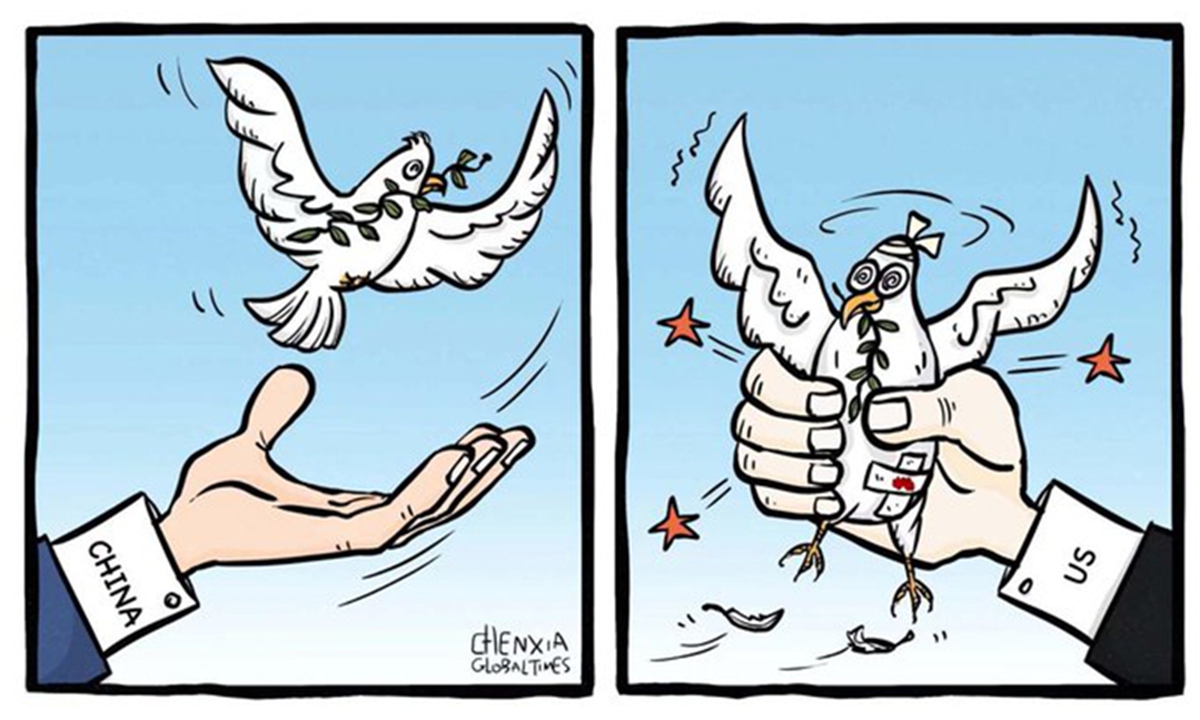
Illustration: Chen Xia/GT
The Red Sea, once a bustling waterway that attracted a large number of cargo ships from around the world, is now in turmoil. Amid all the intricacy and complexity, China has raised a fair voice.
In the Egyptian capital of Cairo on Sunday, Chinese Foreign Minister Wang Yi expressed grave concern over the escalating tensions in the Red Sea. He called for an end to the harassment of civilian vessels in the Red Sea, while noting that the UN Security Council has never authorized any country to use force against Yemen. Wang called for refraining from taking any actions that will "add fuel to the fire" in the Red Sea and raise the overall security risks in the region.
China's fairness lies in not taking sides or showing bias. This is in stark contrast to how Western countries touch upon on the Gaza war, in which they tend to overwhelmingly blame Hamas without mentioning the reasons behind Hamas' attacks. China, on the other hand, does not support the Houthis' use of violence to disrupt the trade route in the Red Sea, but it also disagrees with the US-led biased approach and double standards in the hostilities between Israel and Palestine, as well as the use of violence to counter violence.
Wang said the UN Security Council has never authorized any country to use force against Yemen. To be straightforward, the Western alliance's attack in the region is unauthorized and illegal.
Houthis'attacks in the Red Sea is a protest against Israel's actions in the Gaza war, which actually has caused widespread opposition from the international community, Song Zhongping, a Chinese military expert and TV commentator, told the Global Times.
When the Houthis vowed to attack ships in the Red Sea that are linked to Israel, how did the US respond to that? Escalation. The US first launched a multinational coalition against the Yemeni militants. After seeing the effectiveness of the operation was unsatisfactory, the US and UK militaries launched strikes against Houthi targets in Houthi-controlled areas of Yemen. The missions failed to stop Houthis from attacking shipping, and now Houthis are targeting US ships. A Houthi anti-ship ballistic missile struck a US-owned and operated cargo ship on Monday. What's the point of that escalation?
This retaliation and counter-retaliation are snowballing in the Red Sea. It is now evident that the US and the UK have underestimated the military capabilities of the Houthi militants. Experts believe that the US will find it difficult to contain the Houthis, and that the Red Sea crisis won't be resolved any time soon.
Against this backdrop, media outlets from various countries have noticed an interesting phenomenon: Maritime ships are signaling their Chinese identity in the Red Sea to avoid being targeted by the Houthis.
This is a reflection of China's soft power. "The Houthi militants have no interest in attacking Chinese ships. The reason is simple - China makes fair remarks and takes fair actions concerning Middle East affairs. China does not have any special interests in the region and cares only about regional peace, security, and stability," Shen Yi, a professor at Fudan University, told the Global Times.
China has played a constructive role in fostering peace in the Middle East. The Chinese-mediated detente between Iran and Saudi Arabia has driven a "wave of reconciliation" in the Middle East. The Arab League decided to re-admit Syria after shunning it for 12 years. Turkey and Egypt realized full normalization of relations, ending nearly a decade of diplomatic hostility.
After the Gaza conflict broke out, Special Envoy of the Chinese Government on the Middle East Issue Zhai Jun visited a number of Middle East countries calling for ceasefire and creation of conditions for the resumption of the peace process. China has also joined in the co-sponsorship of the draft UN Security Council resolution aimed at removing bottlenecks to humanitarian access and alleviating the humanitarian disaster in Gaza.
In contrast, US' comprehensive and overt support for Israel has directly led to the prolongation and escalation of the war. It is also due to the obstruction by the US that the UN Security Council has repeatedly postponed the draft resolution aimed at bringing in some form of ceasefire. The biggest difference between China and the US in Middle East affairs is that China is a responsible major power, and its responsible actions have been recognized by all parties, Shen said.
As Wang mentioned in Egypt, the priority now is to stop the conflict as soon as possible to prevent it from further escalation or even getting out of control.
If Washington and London genuinely want an end of the crisis in the Red Sea, the only way out is to end the Gaza crisis, withdraw what should be withdrawn, end wrong support, and apply pressure where it's needed.













